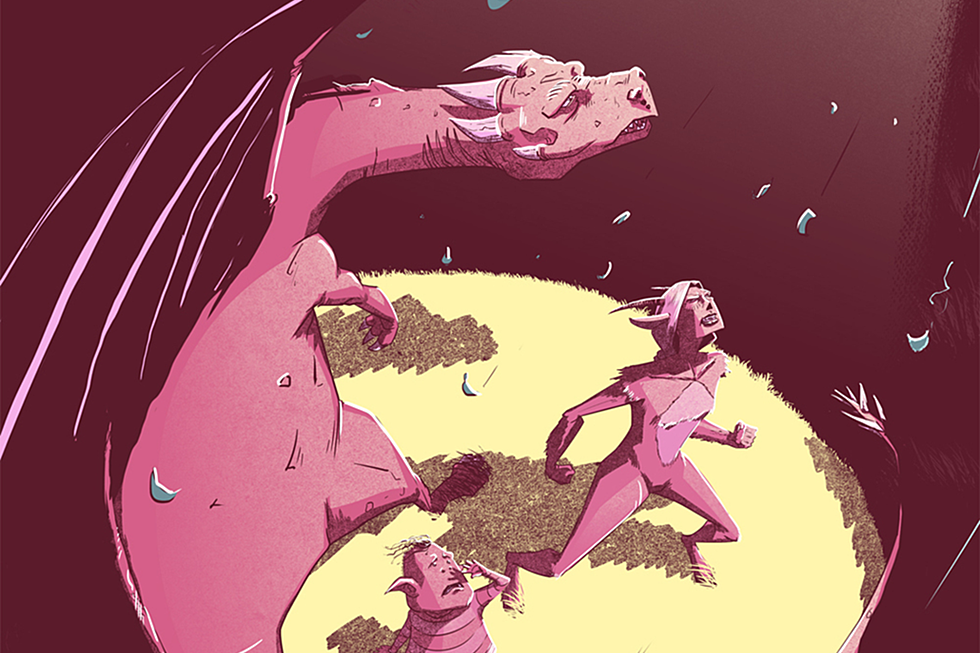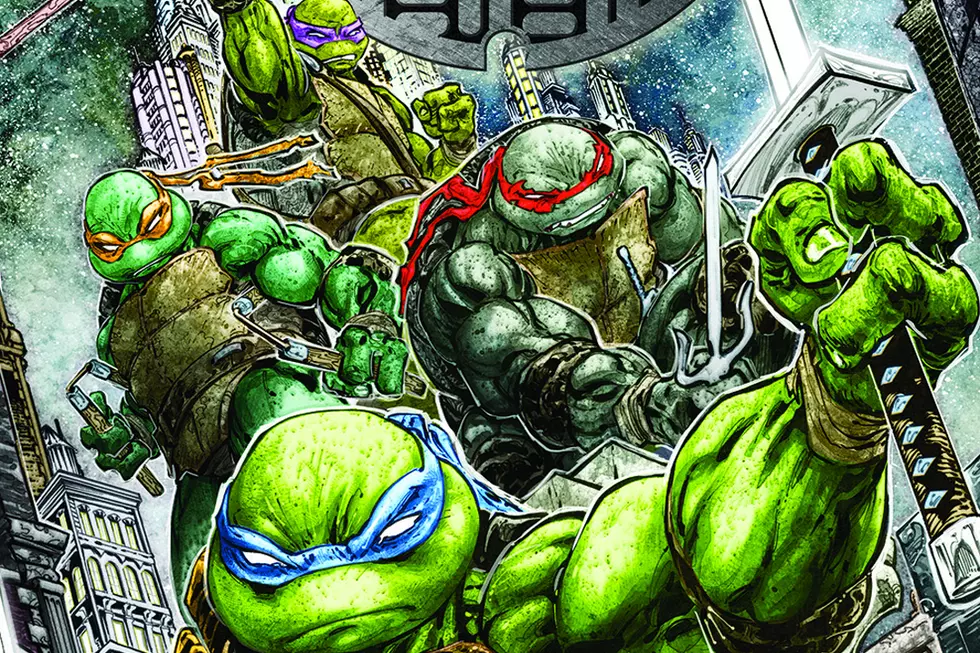![Paul Allor On The Murder Mystery And Romance Of ‘Tet’ [Interview]](http://townsquare.media/site/622/files/2015/10/Tet01-630x420.jpg?w=980&q=75)
Paul Allor On The Murder Mystery And Romance Of ‘Tet’ [Interview]
Paul Allor and Paul Tucker's Tet is a difficult book to put in a category. It's a murder mystery that spans decades, a heartbreaking romance and a story about interruptions and trying to go back to the past, all set against the background of the Vietnam War and the people who lived through it. Halfway through its four-issue run, the questions are mounting up for Lt. Eugene Smith, his former fiancee and the detective who helped him investigate a murder on the eve of the 1968 Tet Offensive, and the revelations are just about to start.
To find out more, I spoke to Allor about his approach to the story, the difficulty of blending so many genres, and how he and Tucker set out to tell "an anti-white-savior story."
ComicsAlliance: As someone who is most familiar with your work through the GI Joe story about Cobra Commander as a pirate and Teenage Mutant Ninja Turtles, Tet was a pretty big tonal shift for me.
Paul Allor: [Laughs] Uh huh.
CA: Do you have any thoughts on people familiar with you from those comics following you to what's turning out to be a very different sort of story?
PA: I think you can look at my relatively short career as a whole so far, and that kind of seems to be the pattern. I try to push myself to do new things quite a bit. It's very different from GI Joe, but also all of the Turtles stuff I've done has been pretty different, even from each other. I did a young adult fantasy story called Orc Girl, Strange Nation was kind of a wacky adventure story. So yeah, every time I take on a new project, I try to push myself into a different area. I think my writing is always recognizably mine, so there's hopefully a common thread throughout, but I don't know. I think people who enjoy my work-for-hire stuff would enjoy this, too, even though it is different. So far, I haven't had any complaints.
CA: I've definitely enjoyed the issues so far, and what really struck me was that it spans a few different genres.
PA: Yes.
CA: It's a murder mystery, but it's a murder mystery set partially during the Vietnam War, so there's a war comic aspect to it, too. Was that difficult, to find that balance between war story, murder mystery, and a very personal romance story?
PA: I don't really think of it as a genre book at all. I tend to think that what makes a genre book a genre book is that you're dealing with certain narrative conventions, and Tet sometimes, by happenstance, glances against them, but it's definitely not something we're focusing on. A lot of people have said --- and we've even said this in the marketing --- that it's a war book and a crime book and a romance, but really, I just think of it as a romance at heart that takes place during a war and has a crime in it. Juggling those elements isn't really any more difficult than juggling any plot with a lot of complex elements. I just treat them all as the same story and don't think of it as shifting from one genre to another.
CA: Was it a very research-intensive book?
PA: Yeah, extremely, both for me and for Paul Tucker, the artist. He's amazing, and he did a ton of research as well. I researched it quite extensively, even before I started writing, and then I continued to as I was writing, when questions would come up. I was already reading all of this stuff, and I kept on going, because my hope was that it would give it a sense of verisimilitude. We've actually heard from Vietnam veterans who have been very pleased with how well we... I don't want to say how well we know the experience of being there, because I don't think you could ever do that in a comic book, but we have heard from people who felt that it was a fair reflection of their experiences. That's just incredibly flattering. Not only their experiences in the war, but their experiences afterward as well.
The thing about Tet is that it's as much about being a veteran and being someone who is living in a country that's been changed by war, in the case of the Vietnamese characters, as it is about the war itself. The aftermath of Vietnam is as much, if not more, of a subject of the book than the war itself.
CA: Was that always an aspect that you wanted to explore? I was wondering if there was a time that you thought of telling the story without the flashback element, just going in chronological order with the murder in 1968.
PA: I think from the beginning that I had the initial seed of the story, that it was going to be an investigation that was interrupted by the war, and then revisited much later, after the war. It was baked into the concept from the beginning that we'd see how those characters were different in those two settings, and see how much had changed through their investigation.
CA: What was it about the crime that we see in the book, the double murder of an American soldier and a Vietnamese spy that Smith and Bao are investigating, that you thought would hook these characters for sixteen years, even after everything else they'd been through?
PA: I think it was the idea of something being interrupted. The murder investigation itself is interrupted by the war, but also the characters' lives, in ways that will be revealed through the end of the book. It's so important to them because it's emblematic of this time in their lives when they were going in one direction, and then they were thrown into a completely different path, in some cases in a way that they've never recovered from.
CA: So will we see a resolution for the romance aspect as well?
PA: [Laughs] No.
CA: There's an interesting aspect of the book, in that when we first see Eugene, he's, for lack of a better term, making the most of his time in the war. He's found someone he's in love with, he's learned the language. Then, just a few pages later, we cut to 1984, and he's just broken. Right after he talks about never going back to his hometown, we cut to him living in his hometown, and even Paul Tucker's art gets gray and muted. Did you ever think about separating the story in a different way?
PA: The first issue only has a very brief flash-forward, and there was a point where I thought about waiting until #2. There were two reasons for it, and the first was that from an organic standpoint, I wanted to show it early on so that it's jarring. From a storytelling standpoint, it adds a lot of tension and weight to the story when we immediately see what's down the road from Eugene. You see his reality right away, from the start, rather than teasing it out as we go, and then for the rest of the story, one of the mysteries is seeing how he got there.
For me, it's less about the murder and more about what happened to the characters in the war that led them to the future that we see. It's less about things developing and more about things being uncovered. The majority of the story is done by the time we start reading, and we're just uncovering, piece by piece, the details of what occurred. I think that makes more sense in #3 and #4, especially.
CA: You've talked about the core being about things that are interrupted, but you also get the idea of going back to your past, too. Eugene not only returns to the investigation, but he literally goes back to Vietnam to wrap up all of this unfinished business. Is that an equally important aspect for you?
PA: Absolutely, I do. That especially comes into play as we get closer to the end of the story as well. I think Eugene knows that he can never return to what was, but he really needs to reconcile that within himself. There's a lot of ugly aspects to his character that I don't think we shy away from. They're not immediately ugly or villainous in the way that a lot of characters are, but if you look at what he's thinking and his motivations, there's a certain weird, ugly patriarchal attitude that he has that drives a lot of his actions.
CA: There's a scene with Há where he tells her, someone who's living in Vietnam during the Vietnam war, that she doesn't know what it's like to lose people.
PA: Right, yeah. In a weird way, Tet is kind of an anti-"white savior" story. It's about a guy who clearly tries to be a white savior, but whereas in a lot of other stories he'd succeed, in this one, it doesn't go so well for him.
CA: It's an interesting aspect. I don't want to spoil things for readers...
PA: It's a tricky book to talk about before it comes out, and I'm hoping readers will stick with it until the end. I think the story reads well in issues, and each of the issues are their own distinct chapters, but at the same time, the whole story is significantly more powerful than any other part of it.
CA: There's this recurring theme of Eugene making a lot of assumptions that go bad on him. Nothing is what he thinks it is.
PA: I'm so glad you said that, because the fourth issue is all that. It's all Eugene's assumptions falling away, and the final conversation that Eugene has in the book ends with someone basically destroying the last assumption he was making in a way that fundamentally changes him.
CA: That's very much a crime story technique, too, that idea of turning around assumptions, and you've applied it to a romance.
PA: Yeah. I really do feel like it's a mystery story, but the murder is not the most interesting mystery in the book.
Tet is out currently from IDW and Comics Experience.
More From ComicsAlliance

![The Usual Suspects Get New Looks In IDW’s ‘Clue’ [ECCC ’17]](http://townsquare.media/site/622/files/2017/03/clue_featured.jpg?w=980&q=75)







